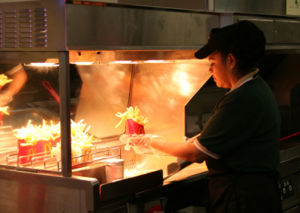McDonald's: Difference between revisions
imported>John Stephenson (Supersize Me; McLibel) |
imported>Hayford Peirce (changed some English formatting to American, as it is an American corp. Also removed most of the final sentence, as it is either biased or meaningless.) |
||
| Line 3: | Line 3: | ||
'''McDonald's''' is the world's largest chain of fast-food [[restaurant]]s. A multinational [[corporation]] headquartered in Oak Brook, [[Illinois]], it began as a modest hamburger restaurant at a single location in San Bernadino, California. After being bought by Ray Krock in the 1950s, McDonald's began to expand greatly. It is best known for [[hamburger]]s and [[french fries]], but now sells many other food items. | '''McDonald's''' is the world's largest chain of fast-food [[restaurant]]s. A multinational [[corporation]] headquartered in Oak Brook, [[Illinois]], it began as a modest hamburger restaurant at a single location in San Bernadino, California. After being bought by Ray Krock in the 1950s, McDonald's began to expand greatly. It is best known for [[hamburger]]s and [[french fries]], but now sells many other food items. | ||
Apart from selling [[fast food]], McDonald's is also well-known for various controversial claims made by both the company and its critics. For example, the company was singled out by [[film]]-maker [[Morgan Spurlock]] in his [[documentary film]] ''[[Supersize Me]]'' for selling [[health|unhealthy]] products as a complete "meal"; Spurlock's methodology of eating nothing but McDonald's food for 30 days was vigorously criticised by the corporation, and attempts at reduplicating his experiences have produced mixed results. For several years, the company was also at the | Apart from selling [[fast food]], McDonald's is also well-known for various controversial claims made by both the company and its critics. For example, the company was singled out by [[film]]-maker [[Morgan Spurlock]] in his [[documentary film]] ''[[Supersize Me]]'' for selling [[health|unhealthy]] products as a complete "meal"; Spurlock's methodology of eating nothing but McDonald's food for 30 days was vigorously criticised by the corporation, and attempts at reduplicating his experiences have produced mixed results. For several years, the company was also at the center of the "[[McLibel]]" legal storm, in which two [[environment]]al [[activism|activist]]s were sued by McDonald's for handing out leaflets in front of their restaurants claiming that the food was unacceptably poor, that the company damaged the environment, exploited workers, and pursued various other un[[ethics|ethical]] practices. McDonald's eventually won its case. | ||
==External links== | ==External links== | ||
*[http://www.mcdonalds.com mcdonalds.com] - official website | *[http://www.mcdonalds.com mcdonalds.com] - official website | ||
Revision as of 23:24, 23 June 2007
McDonald's is the world's largest chain of fast-food restaurants. A multinational corporation headquartered in Oak Brook, Illinois, it began as a modest hamburger restaurant at a single location in San Bernadino, California. After being bought by Ray Krock in the 1950s, McDonald's began to expand greatly. It is best known for hamburgers and french fries, but now sells many other food items.
Apart from selling fast food, McDonald's is also well-known for various controversial claims made by both the company and its critics. For example, the company was singled out by film-maker Morgan Spurlock in his documentary film Supersize Me for selling unhealthy products as a complete "meal"; Spurlock's methodology of eating nothing but McDonald's food for 30 days was vigorously criticised by the corporation, and attempts at reduplicating his experiences have produced mixed results. For several years, the company was also at the center of the "McLibel" legal storm, in which two environmental activists were sued by McDonald's for handing out leaflets in front of their restaurants claiming that the food was unacceptably poor, that the company damaged the environment, exploited workers, and pursued various other unethical practices. McDonald's eventually won its case.
External links
- mcdonalds.com - official website
- Supersize Me - website for the documentary film
- McLibel - documentary film
